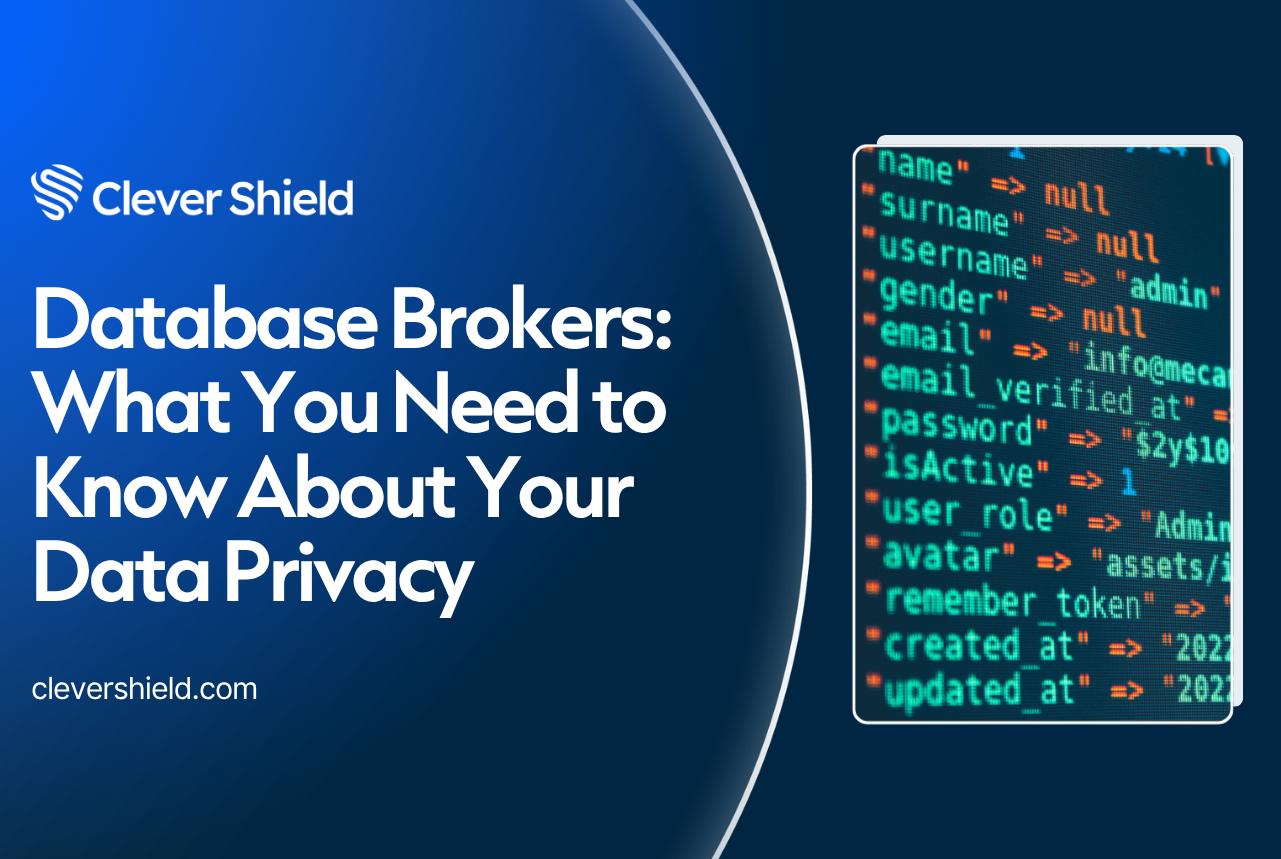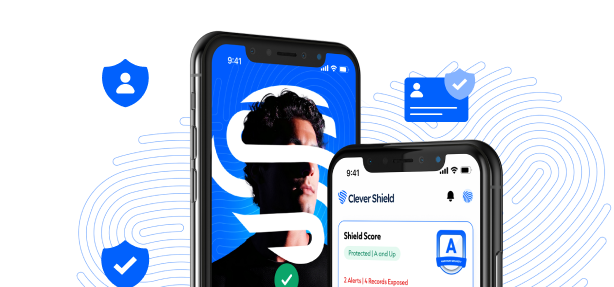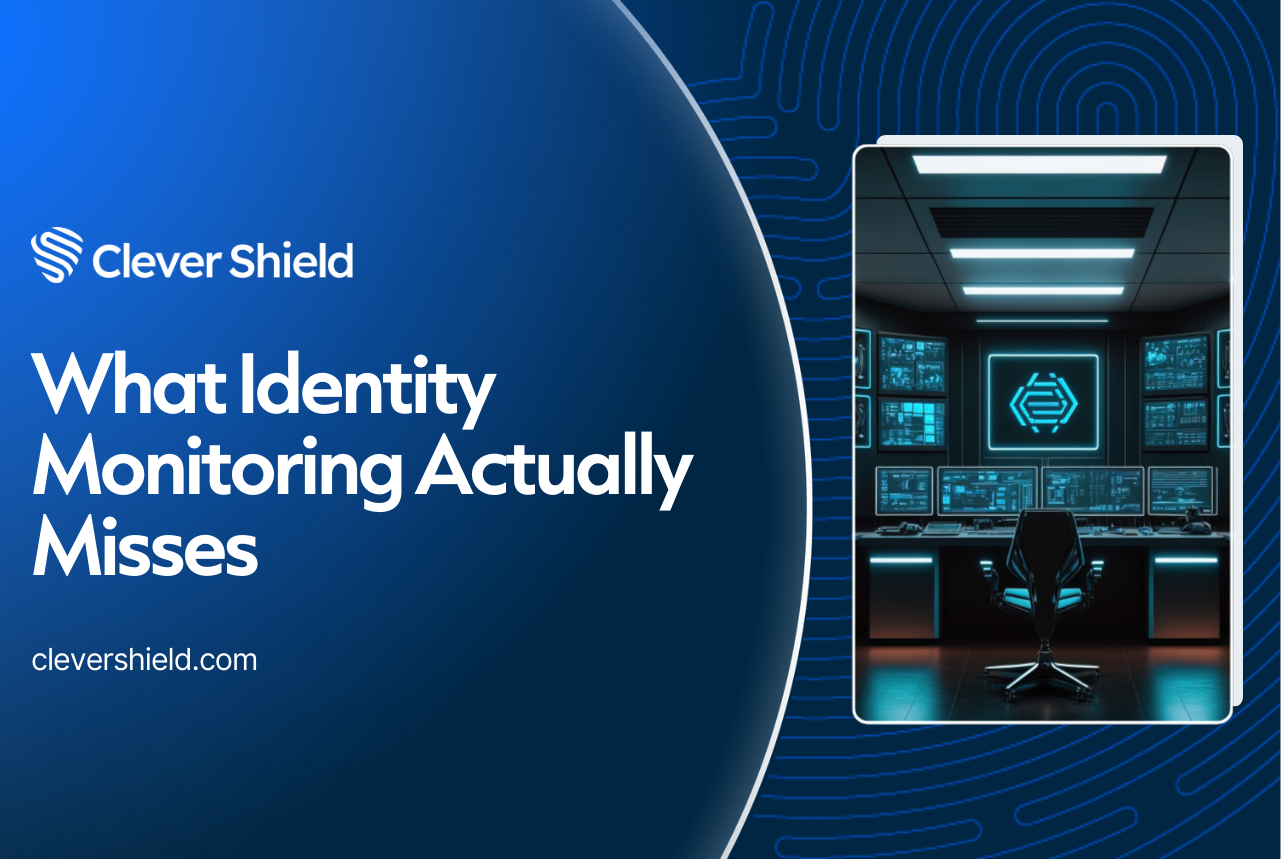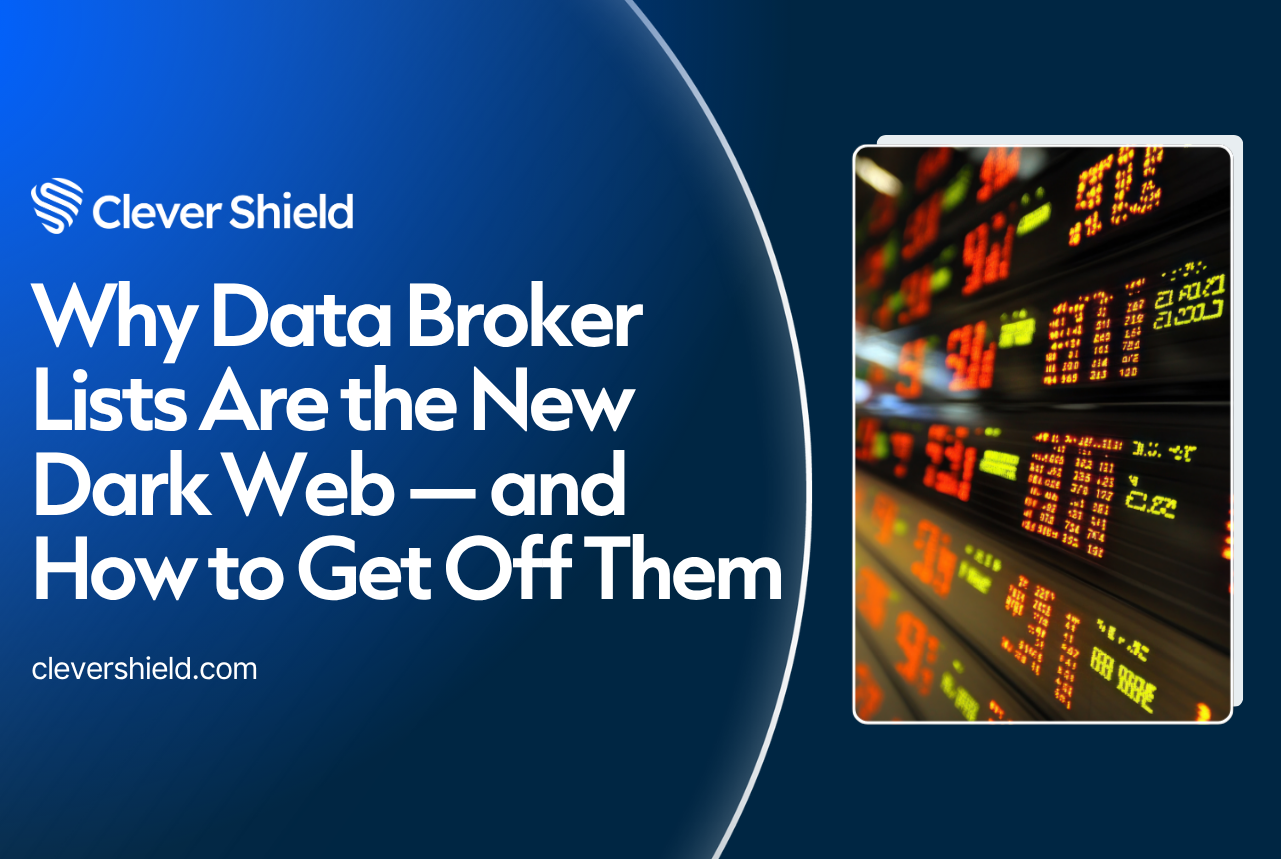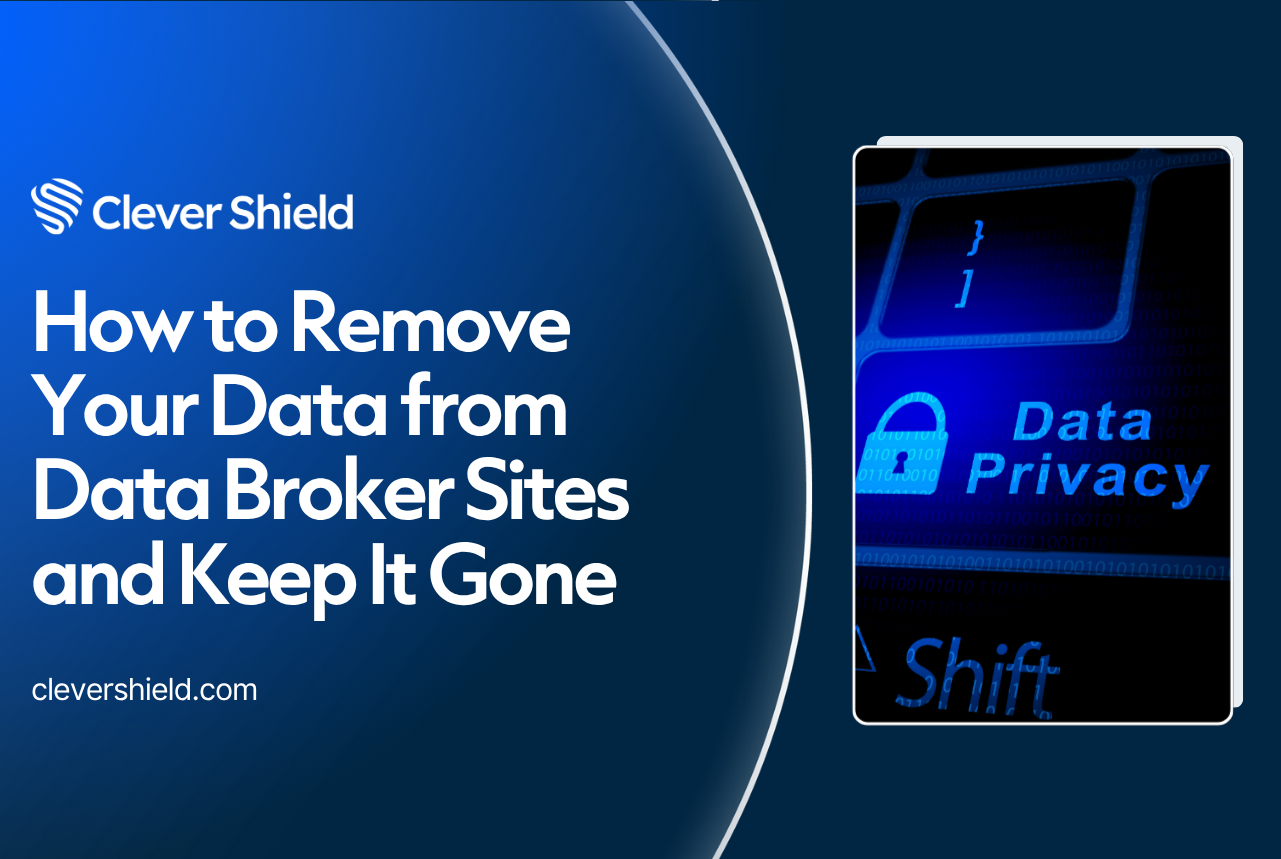Who are database brokers and how do they impact your data privacy? Database brokers collect and sell your personal data, often without your knowledge. This article will uncover their methods, the types of data they gather, and how you can protect your information.
Key Takeaways
Database brokers collect and sell personal data, thriving on weak privacy laws, with a market value exceeding $200 billion.
The data broker industry poses significant risks including identity theft, privacy invasion, and data breaches, which expose sensitive personal information.
Protective measures against data brokers include opting out of their databases, utilizing privacy tools, and employing services like Clever Shield for comprehensive data protection.
What Are Database Brokers?
A database broker is an organization that collects and sells personal data. They play a pivotal role in the digital economy, acting as intermediaries who gather and distribute consumer data to various third parties, including advertisers, marketers, insurance companies, and even government agencies. This practice has become a cornerstone of the data broker database-driven economy, where information is as valuable as currency.
The data broker industry is a rapidly growing market, valued at a staggering $200 billion. This growth is fueled by technological advancements and the increased capacity to analyze vast datasets. Major data brokers like Experian and Equifax are household names, but they are just the tip of the iceberg. There are at least 4,000 largest data brokers in operation today, many of which operate under the radar, highlighting the significance of data brokerage in today’s economy.
Despite their pervasive presence, most individuals are unaware that their data is being collected and sold. The business model of data brokers thrives on weak privacy laws and consumer inaction. Grasping the extent of their operations helps in reclaiming control over our personal information.
How Database Brokers Collect Data
Data brokers collect data from a multitude of sources. These include internet-based resources such as social media platforms, where users voluntarily share information about their lives, and publicly available records like court documents and government databases. Compiling information data brokers from diverse sources enables other data brokers to build comprehensive consumer profiles.
Advanced tools and technologies play a significant role in data collection, including:
Tracking cookies and pixels, which data brokers use to monitor online consumer behavior and gather insights into browsing habits and preferences.
Mobile devices and Internet of Things (IoT) technologies, which provide location and behavioral information through apps and sensors.
Automated tools like web crawlers, employed to scrape publicly available information from websites and directories, adding another layer of depth to the data broker databases. Additionally, these tools help analyze data to enhance the understanding of consumer trends.
Awareness of these methods is crucial for individuals seeking to protect their data. Awareness of how collecting personal data is done can help us take proactive steps to limit our digital footprint and safeguard our personal information.
Types of Data Collected by Database Brokers
Database brokers collect a wide array of data types. Demographic data, which includes information such as age, gender, race, and location, is fundamental for segmenting consumer markets and targeting marketing efforts. Financial data is another critical category, encompassing credit scores, loan information, and other financial records that are essential for assessing an individual’s creditworthiness.
Health data is also within the purview of data brokers. This category includes information on health-related purchasing data and behaviors, which can be used for targeted health marketing and inferred data points for analysis.
Behavioral data, which tracks consumer habits and interests, is particularly valuable for creating detailed consumer profiles and driving targeted marketing campaigns. Combining various data types allows data brokers to sell consumer data and create rich, multifaceted profiles, offering a deep understanding of individual consumers.
Legal Landscape for Database Brokers
The legal landscape for data brokers is complex and often lacking in comprehensive regulations. In the United States, there is no unified national privacy law, resulting in a patchwork of state-specific regulations. For example:
California and Vermont have taken steps to regulate data brokers.
These states require data broker registries to register.
They also require compliance with specific privacy mandates, making data brokers legal in those jurisdictions.
California’s Consumer Privacy Act (CCPA) is a notable example, mandating that data brokers register with the California Privacy Protection Agency and adhere to certain privacy standards. On a federal level, the American Privacy Rights Act of 2024 aims to provide more comprehensive privacy protections, but its future remains uncertain. The Federal Trade Commission (FTC) also plays a role in enforcing practices against unfair or deceptive privacy and data security measures.
In contrast, the European Union’s General Data Protection Regulation (GDPR) offers robust privacy protections, requiring explicit consumer consent for data collection and allowing individuals to request data deletion. This discrepancy highlights the challenges and opportunities in regulating the data broker industry.
Risks Associated with Database Brokers
The activities of data brokers affect pose several significant risks:
Identity theft, as the sensitive information collected can be exploited by cybercriminals.
Serving as a single point of failure for vast amounts of personal data, making them attractive targets for hackers.
Misuse of personal data leading to sophisticated scams and financial fraud.
Privacy invasion is another critical risk. Data brokers can de-anonymize and publish personal information, leading to unintended harm and unwanted surveillance. Data breaches further exacerbate these risks, exposing sensitive information like Social Security Numbers, which can have severe consequences for affected individuals. A risk assessment of data privacy is essential to mitigate these threats.
Identity Theft and Fraud
Identity theft and fraud are significant threats posed by data brokers. Cybercriminals can misuse the data collected to execute sophisticated scams, resulting in substantial financial losses for individuals. The Federal Trade Commission (FTC) offers guidance on safeguarding personal information and recovering from identity theft, emphasizing the importance of proactive measures.
Government resources like IdentityTheft.gov provide essential support for reporting identity theft and recovering stolen identities. The Consumer Financial Protection Bureau (CFPB) also offers valuable advice on protecting consumer information, helping consumers to mitigate risks.
Privacy Invasion
Privacy invasion is a significant concern with data brokers. These entities often publish personal information, including home address, phone numbers, and contact details, making it easily accessible online. Exposing such sensitive information increases the risk of unwanted surveillance and privacy breaches. Personal information data brokers can release this information to authorities without user consent, further compromising individual privacy.
Data Breaches
Data breaches are catastrophic events that highlight the vulnerabilities within the data broker industry. Notable breaches include incidents involving major data brokers like Acxiom, Epsilon, and Experian, where millions of personal records were compromised. A data breach, such as Social Data’s accidental exposure of 235 million social media accounts, is another stark example.
These breaches expose sensitive information such as Social Security Numbers, leading to severe consequences for the affected individuals.
How to Opt-Out of Database Broker Sites
Removing your personal information from data broker sites is a crucial step in safeguarding your privacy. Many data brokers allow individuals to submit opt-out requests, but the process can be complicated and time-consuming. Manually removing information requires submitting all possible variations of your name and repeating the process every few months to ensure your data remains removed on people search sites and a people search website.
Alternatives such as PrivacyDuck and DeleteMe offer services to manage these requests on your behalf, simplifying the opt-out process. Aura, for example, checks daily to ensure that your information has not been re-added after removal, providing an additional layer of privacy.
Resources like the Privacy Rights Clearinghouse list various data brokers and their opt-out details, aiding in the opt-out process to stop data brokers.
Protecting Your Data from Database Brokers
Protecting your data from database brokers requires a proactive approach. Key methods include:
Utilizing browser extensions that block tracking
Using a VPN to hide your IP address
Using strong, unique passwords for different accounts
Regularly reviewing privacy settings on social media platforms These steps can significantly reduce data collection and enhance security.
Limiting the amount of personal information shared online and subscribing to identity monitoring services can alert you to potential misuse of your personally identifiable information, helping to maintain your privacy. Taking these steps is essential to protect personal information from data brokers.
Clever Shield: Your Solution for Data Protection
Clever Shield is designed to provide comprehensive data protection, offering:
Automated data removal from people finder sites
Real-time monitoring of sensitive information
Real-time alerts for suspicious activities, allowing users to take prompt action to secure their personal information
Identity theft insurance with coverage of up to $1 million, providing financial protection against identity theft-related expenses.
Clever Shield actively prevents and mitigates risks associated with database brokers, saving victims hundreds of hours of stress, paperwork, and disputes by automating the hardest parts of identity restoration.
Trusted Resources for Identity Theft and Fraud Recovery
Trusted resources play a critical role in helping individuals recover from identity theft and fraud. The Consumer Financial Protection Bureau (CFPB) provides comprehensive information on preventing fraud and managing financial resources. The IRS maintains a dedicated Identity Theft Central page, outlining steps for taxpayers who believe they are victims of identity theft.
Using resources like:
CFPB
IRS Identity Theft Central
FTC Identity Theft
CISA Cybersecurity is vital for effective recovery from identity theft and fraud. These trusted sources offer guidance and support for individuals dealing with identity theft.
Summary
Understanding the role and risks of data brokers is essential in today’s digital world. By knowing how data is collected and the types of information gathered, we can take proactive steps to protect our privacy. The legal landscape may be complex, but there are actionable measures we can take, such as opting out of data broker sites and using services like Clever Shield for data protection. Armed with this knowledge, we can better safeguard our personal information and mitigate the risks posed by data brokers.
Frequently Asked Questions
What is a data broker?
A data broker is an organization that gathers personal data and sells it to third parties like advertisers and marketers. Their practices raise important privacy concerns that consumers should be aware of.
How do data brokers collect information?
Data brokers gather information from multiple sources such as social media, public records, online transactions, and tracking technologies like cookies. This extensive data collection allows them to profile individuals for various purposes.
What types of data do data brokers gather?
Data brokers collect a variety of information, such as demographic, financial, health, and behavioral data, to construct comprehensive consumer profiles. This extensive data collection enables businesses to better target their marketing efforts.
How can I opt out of data broker databases?
To opt out of data broker databases, submit removal requests directly to the data broker sites or utilize services like PrivacyDuck and DeleteMe for assistance. Taking these steps can help protect your personal information from being publicly available.
What resources can help with identity theft recovery?
To effectively recover from identity theft, utilize resources such as the Consumer Financial Protection Bureau (CFPB), IRS Identity Theft Central, and the FTC Identity Theft website, which offer valuable guidance and support. These organizations are key in helping you navigate the recovery process.

